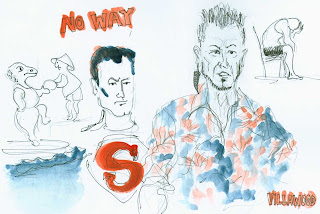
My idea of a mini-break is talking at a law-and-humanities seminar, so I've come to the Swedish university town of Örebro in lilac time.
Before kick-off we're serenaded by music students: Simon and Garfunkel's
The Boxer, then Joni Mitchell's
Woodstock - 'Did any of you recognise that song?' asks a singer brightly, as if Woodstock were no longer within living memory...
Then we're let loose on
law and arts in crime settings. I give them the Nuremberg trials, the Naked Rambler, Marie-Antoinette and a whole lot more, knocking over a glass of water for added attention-seeking. The keynote speaker, sensing my shallow neediness, says it was 'fantastic' and that's all I want, frankly.
Altti Kuusamo, Professor Emeritus of Art History, University of Turku,
Finland, unpicks his keynote speech: 'Dynamics of the detail in art and "crime" from the visual to
downcast eyes of the prestige'.
Now, there's a bit of a conference arms race in some circles, in terms of piling on the entertainments, although these risk overshadowing the main event. As I'm the only person here who hasn't got a career to ruin, I'm free to relay the mutterings-in-corners about this conference:
1. The expense. Abacus-wielders at universities, who've twigged that academics get subsidies to attend conferences, like to host pricey ones. Not every academic here can get reimbursed, however.
2. Misdescription. It's called a round table but King Arthur wouldn't fancy it: the talks are split into simultaneous workshops so you have to make difficult choices about what to miss.
3. Lack of exposure. People have come here from Asia, America, Australia and Europe to showcase their research and meet potential collaborators/employers. There is also a talent-spotting publisher. Those who are unlucky in the scheduling will address more empty chairs than filled ones. The talks are not recorded. With crisper time-tabling, it would be possible to devote all three days to a genuine round table and still have room for networking. However, this is the total for the three days:
Talks:
7.5 hours.
Keynote speech, one panel discussion, town-hall reception, ceremonies, team-building excursion, meals, refreshments, registration:
21 hours.
The night before giving a talk, one of the attendees has a nightmare: 'I am on the podium and no one can see me. No one can hear my voice.'
4. Lack of IT preparation/support. Time is wasted. They've had a year to plan this.
A team-building exercise in a field is too close to school-sports trauma for me so I opt out, sit on wet grass and grumble. Here is a group trying to build a raft. 'What is a raft? We should have a man on the team.'
Dr Ben Hightower, University of Wollongong: 'Comics and refugee deterrence in Australia'
Christopher Eckels, University of Utah (back view, check shirt) gave a talk called 'Us & them: symbols in violent identity conflict'.
Dr Yanan Zhang of Shanghai University of Political Science and Law: 'A study of crimes in art in China'
Professor David Papke, Marquette University Law School: 'Crime in American popular music'
Professor José Manuel Aroso Linhares, University of Coimbra: 'Under the eyes of Agnès (the woman): tales of crime and punishment told through drama
and music'. (The title refers to George Benjamin's opera Written on Skin
.)
Dr Mark Featherstone, Keele University: 'Visions of the law and its transgression in Nicolas Winding Refn's cinema'
The 19th International Roundtable for the Semiotics of Law, 23-25 May 2018

















